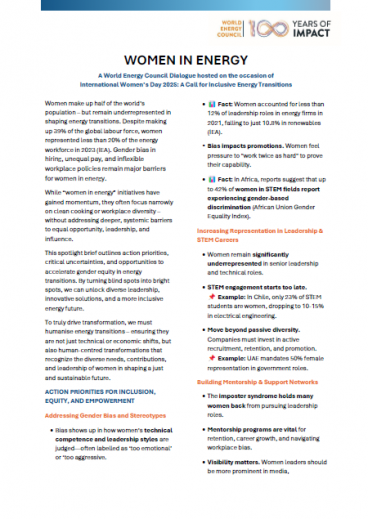The Power of Three
Bringing communities to the table is critical if we want to make energy transitions happen for the benefit of all
This blog was originally posted on LinkedIn by our CEO and Secretary General of the World Energy Council Dr Angela Wilkinson.

Image from the World Energy Council's Humanising Energy Series featuring Jaza Energy, a grantee of EEP Africa based in rural Tanzania that has hired an all-female team to manage its solar energy hubs.
As the 14th Clean Energy Ministerial concludes today, we will see the importance of multilateral meetings in furthering action on global energy transitions. The messages from India that will come out of these four-days of exchange between governments and businesses in Goa will also inform our 2024 World Energy Congress on redesigning energy for people and planet in a new era of progress.
What tends to be missing from these high-level summits is the voice of communities. This is different to the voices of women and youth (which also need to be included) and not the same as the individualistic voice of citizens and consumers.
Redesigning energy for billions of better lives and a healthy planet is best achieved by rethinking ‘how to’ make energy transitions happen and reorganising ‘who with’. Diverse communities need a seat at the table, alongside countries and companies.
And to succeed we will also need new approaches to collaboration, cooperation and cocreation.
Our contemporary understanding of collaboration and cooperation pivot on consensus and reflect either ‘top-down’ or ‘bottom-up’ theories of change.
What would collaboration look like if we can’t wait for consensus and instead open the solutions space to experimentation – a learning compact which embraces the opportunity to learn with failures as well from stories of success? What would cooperation look like if we stretch beyond people who think and look like us to ‘others’ with different needs and experiences?
The World Energy Council has learned a lot about the ‘how to’ and ‘who with’ of energy transition processes over the last 100 years.
International cooperation nowadays must be more inclusive - bridging West vs West vs Rest divisions - and moving beyond the gridlocked politics of polarisation to avoid the growing risk of disorderly energy transitions.
Incrementalism, ‘plus-one’ approaches and ‘middle-way’ consensus are bound to fail. Instead, we are learning to stretch cooperation and collaboration and enable cocreation. We are connecting top down and bottom up to mobilise the ‘missing middle’ by extended our approach to working with the “Power of Three”.
For example, for decades we have championed the World Energy Trilemma concept and framework to support modern energy societies in joining the dots between energy security AND affordability AND environmental sustainability.
And we are currently focused on redesigning energy systems for people AND planet AND progress.
Closing implementation gaps involves a combination of financial AND technological AND social (including institutional) innovation.
The recently released agenda for COP28 also reflects the ‘power of three’ thinking, for example, in its emphasis on the ‘availability AND access AND affordability of financial capital’.
The opportunities of making faster AND fairer AND more far reaching energy transitions happen are not only or all about the future of the energy industry but a remaking of progress - beyond growth.
As we approach our 100th anniversary World Energy Congress, our model of convening power for good is to inform AND inspire AND impact.
We remain committed to pulling world energy transition leadership together –countries, companies and communities – in informed and generative conversations on redesigning energy for people, planet and progress.
Let’s harness and celebrate the power of threes.
Be sure to read the follow-up to this article, published 25 July 2023 in the Financial Times - Letter: Race to zero must be fair for other countries too






_-80_result_688_387_s_c1_c_c.jpg)

